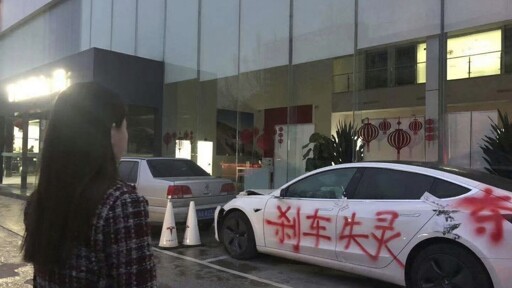Zhang Yazhou was sitting in the passenger seat of her Tesla Model 3 when she said she heard her father’s panicked voice: The brakes don’t work! Approaching a red light, her father swerved around two cars before plowing into an SUV and a sedan and crashing into a large concrete barrier.
Stunned, Zhang gazed at the deflating airbag in front of her. She could never have imagined what was to come: Tesla sued her for defamation for complaining publicly about the car’s brakes — and won. A Chinese court ordered Zhang to pay more than $23,000 in damages and publicly apologize to the $1.1 trillion company.
Zhang is not the only one to find herself in the crosshairs of Tesla, which is led by Elon Musk, among the richest men in the world and a self-described “ free speech absolutist.” Over the last four years, Tesla has sued at least six car owners in China who had sudden vehicle malfunctions, quality complaints or accidents they claimed were caused by mechanical failures.



Yes, if you only consider the letter of the law. But the spirit of the law and the pro-business, pro-those-in-power courts rarely rule in the individual’s favor. The laws weren’t made for you the individual.
Don’t Get Sued! Libel, Slander, and Defamation Laws in Japan
More relevant discussion here about the concept of face.
edit: Key comment here:
“The law in Japan has a cultural and legal background in much older laws about “damage to honour”. Anything that damages someone’s social standing, regardless of whether a specific claim is being made, is not on and is liable to be considered defamatory. Further, the lack of a specific claim makes the “truth and public interest” bar much, much harder to meet since you can’t claim that your statement was truthful or in the public interest if there’s no specific claim the business or person can respond to. If you’re just being insulting you’re one a one-way trip to a legal spanking.”
I live in Japan and self censor what I say online, avoid leaving negative but truthful business reviews, because there is a very real risk of being sued for libel.
Edit 2: I dug up some China specific info: “In Understanding and Application of the 1993 Answers, the SPC [Supreme People’s Court] clarified that truth was NOT a defense to defamation. If a work insults and damages a person’s reputation, it is defamatory even if true.”
I’m having trouble finding more info about the specifics of the ruling in the Tesla case (AP, CBS, English media don’t provide any info), but I’d bet my dollarydoos that the ruling relates to the Chinese civil code concerning the rights of ‘reputation’ and ‘honor’ of Tesla being infringed in this instance. The AP article misses a lot of this nuance and detail, which is unfortunate. Something like The Atlantic or the Economist, Foreign Affairs (or NYT 20 years ago) with long form articles and investigative journalism from the days of old might have provided this detail, but these days BBC, CNN, et al care more about click-thru rates so we don’t get the full picture.